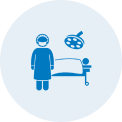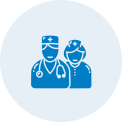JOIN OUR TEAM OF HIGHLY QUALIFIED DOCTORS
We want to hear from you if you would like to make skin cancer medicine your focus, work in a high-level facility, continuously grow in your career, find satisfaction in teaching other doctors, and serve your local community.
If you are passionate about skin cancer, please contact Sarah Williams on 0478 611 063 or sarah.williams@skincancercentres.com.au to hear about our opportunities or click the expressions of interest tab below and we will make contact with you.

Dedicated operating theatres

Nurses assistance in procedures

Nurse-lead wound management

Team with advanced training

Supported education & mentoring

Clinical autonomy & independence
Current Opportunities
Doctors
St George Skin Cancer Centre
Suite 9 Town Square Arcade, 7-9 Belgrave Street, Kogarah NSW 2217
No Items Found
Why choose National Skin Cancer Centres
Improve access to skin cancer care
Improve access to skin cancer care and reduce the mortality and morbidity of the disease.
Reduce waiting times for patients
Reduce the waiting time for patients to receive efficient diagnosis and treatment.
Provide vital skin cancer care
Provide vital skin cancer care to communities with limited or no access to specialists.
Save lives and improve patient outcomes
Save lives by dramatically reducing the delay in diagnosis and treatment.
Relieve the public hospital system
Relieve the public hospital system as most patients cannot afford specialist care.
Provide a referral option for GPs
Offer a high-quality referral option to local GPs managing patients outside their scope.
